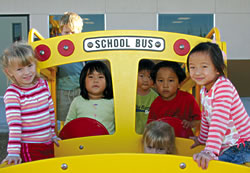FAMILY - FAMILY FEATURES
Parents Evaluate Preschool Education in the New Year
January, 2006 - Issue #15
 Sydney Young, Chloe Arnott, Emily Cho and Christian Kim enjoy playtime in their little yellow school bus. |
By age 4, children are eager to learn. Vocabulary, reading skills, math and science can be taught by using play and creativity. Fine and gross motor skills are built by drawing, finger painting, collage-making and block-building. Preschool gives young children the tools to handle social and emotional situations as well; they learn how to pay attention in group settings, work independently and finish tasks. Many preschoolers enter kindergarten knowing the letters of the alphabet, shapes and numbers.
A preschool is defined as place for children between the ages of 3 and 5, staffed qualified teachers and staff who encourage and supervise educational play rather than simply providing childcare. There are several types of preschools - private and religious based, school district sponsored and state funded. Most provide a combination of half-day and/or full-day care, one to five days a week and others, such as the state-sponsored preschools, offer free or reduced tuition for families with financial needs.
Betty Granger has been working with little guys for the past 10 years as the coordinator of the Newhall School District's preschool program. She describes the preschoolers as "cute and curious."
"This is where it all begins," Granger said. "We find the children in our preschool programs have a love for learning, a love for books and provide them with the skills to make a smooth transition into our kindergarten program."
Granger said the advantage of young children attending a district or state sponsored preschool is the direct interaction of the preschool and kindergarten teachers who meet on a regular basis. School readiness also depends on children's physical health such as vision, hearing, dental and nutrition. Granger said these problems can be identified and addressed early, so the children have a chance to be physically ready to do their best in school.
The Newhall District has several state-funded and district sponsored preschool sites and recently qualified for a Universal preschool - only one out of 100 schools selected from the Los Angeles area.
Universal preschool requires teachers to hold a bachelor's degree along with early childhood education classes. Teaching preschool well is no less demanding or complicated than teaching elementary school according to Preschool California, a nonprofit, non-partisan advocacy group. To keep qualified preschool teachers, they say a competitive salary and good benefits must be offered.
Children's Advocate Rob Reiner and a coalition of business, labor and education leaders are filing a Preschool for All initiative for the June ballot. The initiative will provide free voluntary preschool for all children in the year prior to kindergarten. The schools will be funded by an increase tax rate from the wealthiest one percent of Californians. Funds will be given to both public and private schools who meet the criteria.
With the wide variety of options, experts advise parents to do their homework before placing a child in a particular preschool. Renee Sabol, a Castaic mother of two, said she did some research before selecting two different preschools for her sons. Her oldest son Adam had unique academic needs and Sabol interviewed six preschools before finding a good fit.
"He could already read and knew all the countries of the world and where they were located on the map," Sabol said. "We thought at the time, 'Look how much he's learned on Sesame Street,' while the preschool directors were saying they were not prepared to handle his advanced academic requirements."
Sabol found Creative Years Preschool allowed Adam wide academic freedom. Adam was eventually tested before entering kindergarten and received additional ability-appropriate instruction at Newhall Elementary School. He will begin his freshman year at West Ranch High School in the fall.
His younger brother Nick went to the Castaic Union School District preschool located on the campus of Castaic Middle School. Sabol said she knew the program would dove-tail into the kindergarten curriculum at Castaic Elementary and it was close to home. She also said it was good to learn her younger son was not a morning person which led her to enrolling Nick in afternoon kindergarten class.
Sabol, the president of the Santa Clarita Valley Association for Gifted and Talented, said academic expectations for children have changed and parents need to give their child every advantage. Preschool is a good start, she said.
"Schools have raised the bar and if children are going to be successful, they need to be prepared," Sabol said. "Parents have to do a better job of balancing their child's schedule and they need to remember kids always need time to just be a kid."
Granger said parents are a key component to a child's successful school experience and preparing the young ones for kindergarten in a preschool setting can be fun and educational at the same time.
At the district's newest preschool at Oak Hills Elementary School, Granger watches as the young children file back into the classroom after morning recess. Teacher Ruby Whitefield settles them on the rug and prepares them for snack time. After the children sing a song, they follow Whitefield's directions to wash their hands and walk quietly to the table. The preschool opens at 7 a.m. and children can be picked up anytime after 12 p.m. until 5:30 p.m. And yes, there is a naptime for those who stay through the afternoon.
Most preschools hold registration in the spring and many have waiting lists. Parents are encouraged to get recommendations from teachers and trusted friends, contact the preschool and arrange for a visit.
Once you find a quality preschool for your young child, you are taking the first step in providing them with the tools for a successful academic experience.
|
||||||||||||||||||||||||||||




